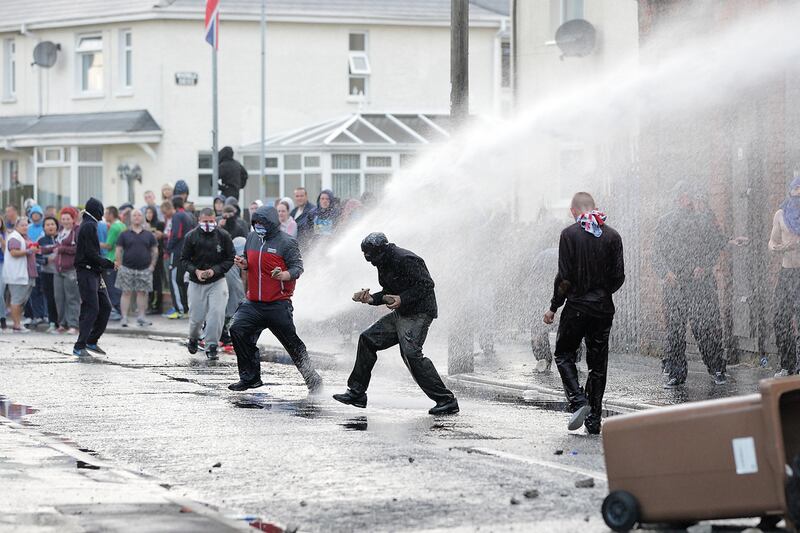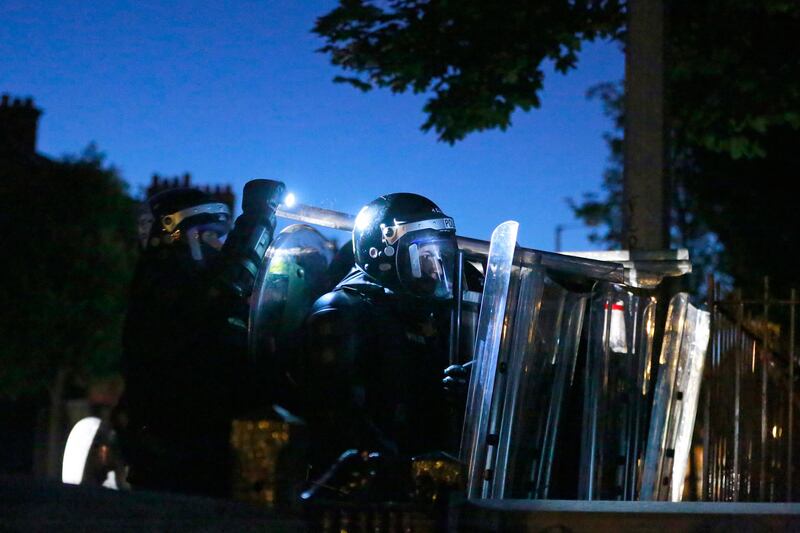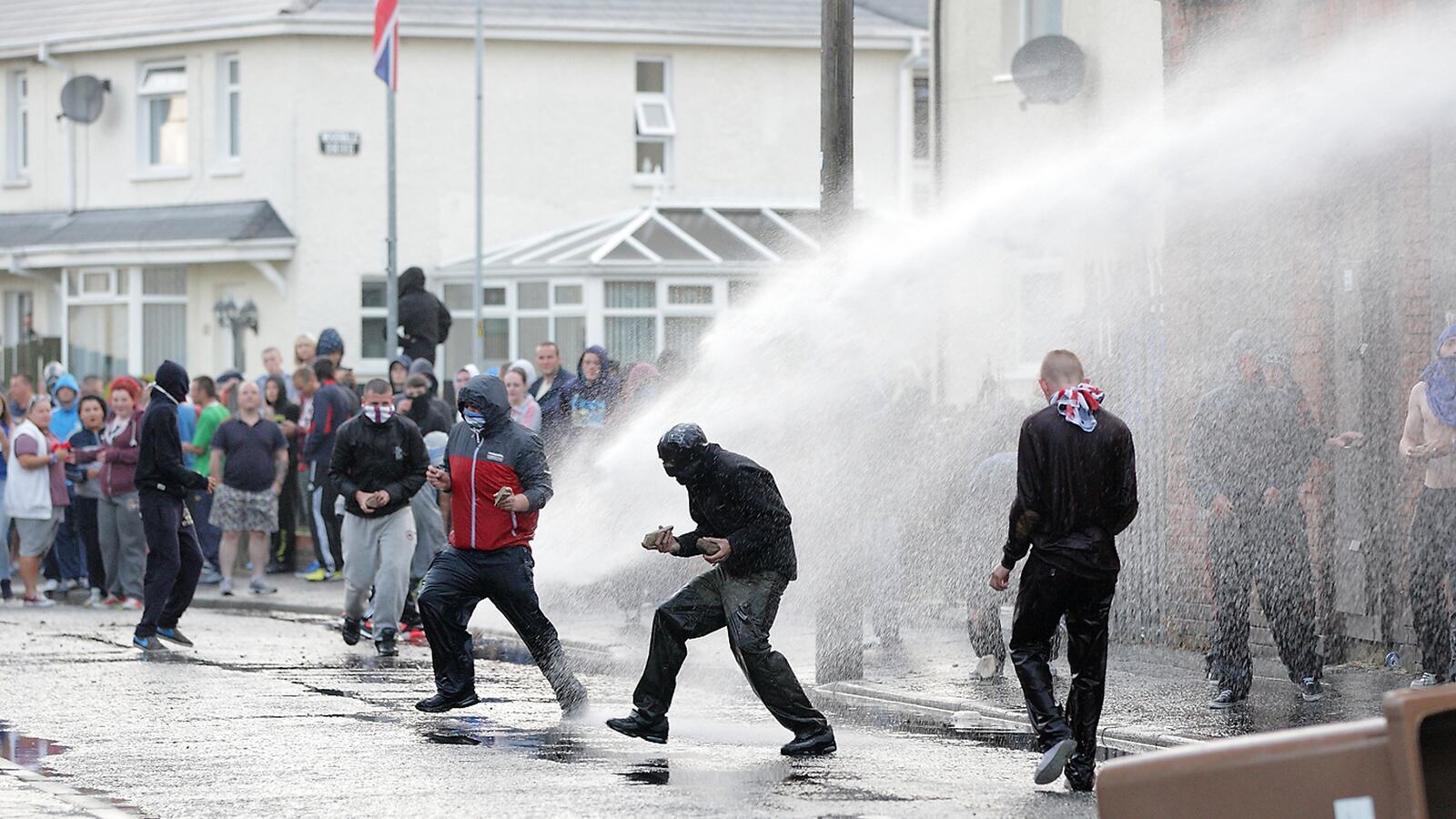Nail bombs, water cannons, and Molotov cocktails have brought chaos to the streets of Belfast again, 15 years after a landmark peace deal to end Northern Ireland’s cycle of violence.

Protestant demonstrators, one of whom brandished a sword, clashed with rival groups and hurled missiles during four nights of rioting that injured at least 44 police officers and knocked one senior politician unconscious.
Joe Biden telephoned Northern Ireland’s leaders Monday to express U.S. concern at the outbreak of violence and to call for an end to attacks on police. Within hours, four blast bombs and a pipe bomb packed with nails had been launched at officers.
Northern Irish police fear the violence will soon become deadly, said Alan Burnside, a spokesman for the Police Federation for Northern Ireland. “Petrol bombs and pipe bombs are a dangerous precursor to shots being fired,” he said. More than 1,000 officers from other parts of Britain were being airlifted into the city on Monday to quell rioting that began over the weekend.
Tensions were already high ahead of this year’s Glorious Twelfth celebrations, during which pro-British union groups stage traditional parades to mark the victory of William of Orange, a 17th-century Protestant king, over his Catholic rival. Bitter disputes over where the Unionists are allowed to march often trigger skirmishes, but this week’s clashes have been the most brutal in years.
“It’s going to be a grim year,” a police source told The Daily Beast. “There was a lull just after the signing of the Belfast agreement in 1998, but this is a mess.”
Running battles erupted in north and east Belfast late on Friday night; Unionists hurled golf balls and masonry at riot police who had blocked them from entering certain parts of the city. When Nigel Dodds, the deputy leader of the Democratic Unionist Party, tried to speak to police officers he was struck on the head by a flying object. As he lay unconscious on the Woodvale Road, he was caught by the blast of a police water cannon.
A party official said Monday that Dodds had been released from hospital and was making a good recovery despite the head injuries.
Monday night saw the most intense assaults yet, with police officers surviving a pipe-bomb attack in the Catholic Ardoyne district and four other blast-bomb incidents in other parts of Belfast. Officers responded to some of the attacks with plastic bullets.
Richard Haass, the president of the Council on Foreign Relations, was due to arrive in Belfast this week as the independent chairman of an all-party group set up to look at the issue of parade routes, as well as controversies over flags, symbols, and emblems, which continue to cause rancor in Northern Ireland. He will try to negotiate a compromise deal between Republicans and the Unionists who want the current parade watchdog to be scrapped.
Biden said he would work closely with Haass, who served as U.S. special envoy for Northern Ireland under President George W. Bush. In a statement, the vice president’s office said: “The people and institutions of Northern Ireland should be commended for the tremendous progress since the 1998 Good Friday Agreement. However, more work remains.”

Although the Northern Irish political establishment has reached a state of some stability, little progress has been made in integrating a city that remains deeply divided along religious lines. When President Obama visited last month, he called for mixed schooling and the end of the “peace walls” that physically divide communities. There appears to be little political will at Stormont to progress with those goals.
Dr. John Bew, a Northern Irish security analyst at Kings College London, said the underlying problems were not addressed by the 1998 power-sharing agreement. “There wasn’t a reconciliation built into the peace process,” he said. “There was a political elite, including terrorist groups, coming to an accommodation. There was no change to the things that underline sectarian issues in Northern Ireland.”
Bew suggested Haass would find it difficult to make meaningful progress without offending one or both sides. “Anything that tries to solve an issue in Northern Ireland, to put a salve on it, tends to enflame the situation,” he said.
This week’s clashes followed a recent spate of foiled attacks by Republican groups who reject the Belfast agreement and want to reestablish a united and predominantly Catholic Ireland. Police in Dublin said last week they had uncovered their biggest haul yet of dissident Republican explosives and weapons. The cache included a submachine gun, pistols, revolvers, and enough Semtex to make 180 bombs.
A 24-year-old American man was one of the latest to be arrested by officers investigating dissident Republican activity. Zachary Gevelinger, of Wisconsin, was reportedly held after a meeting with a woman who has been charged with an attempted pipe-bomb attack on two police officers.
Gordon Fyffe, a spokesman for the Police Service in Northern Ireland, told The Daily Beast that an American man in his 20s was released from custody Monday pending a decision on whether he should be prosecuted by the Public Prosecution Service.
Gevelinger’s family denied to a local CBS news affiliate in Wisconsin that he has committed any crime.






